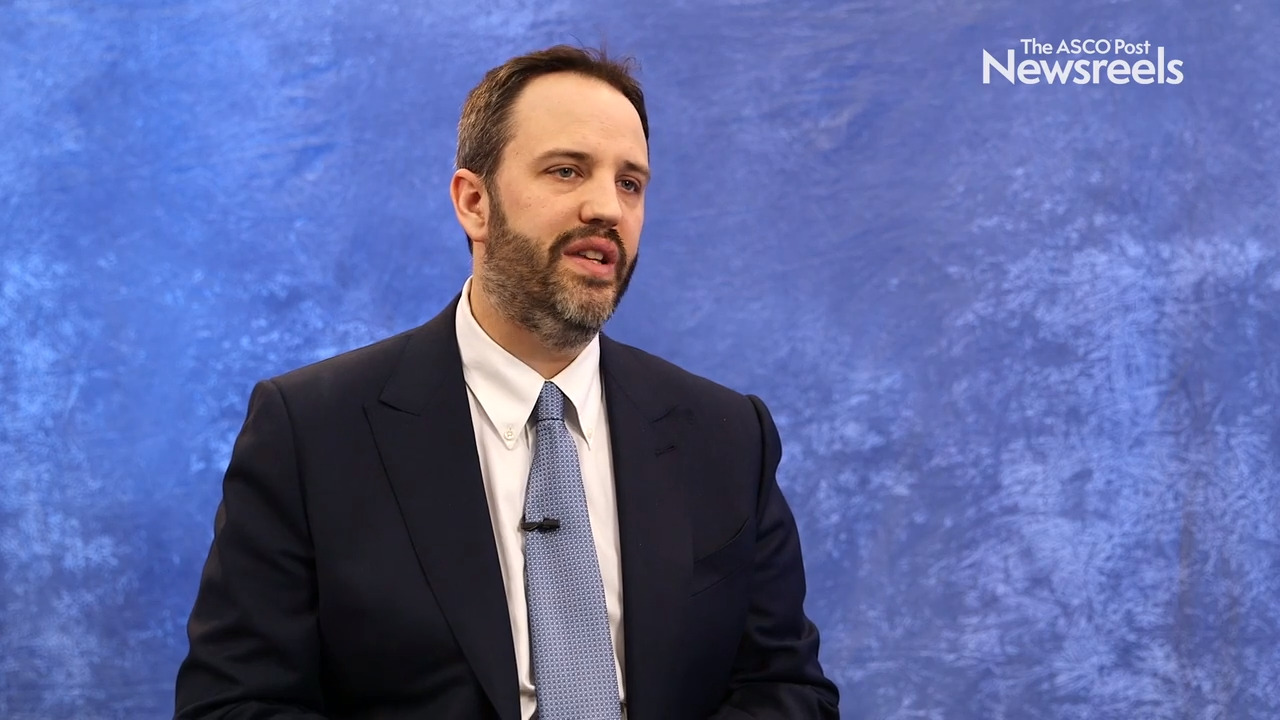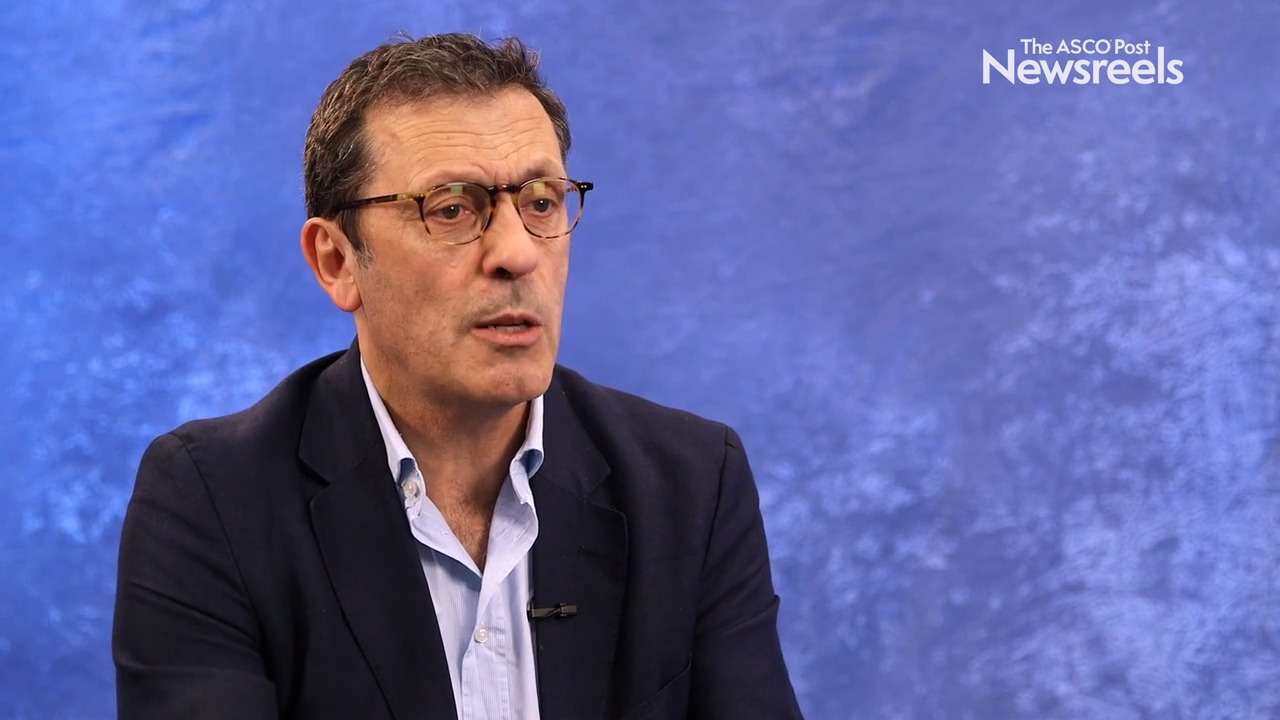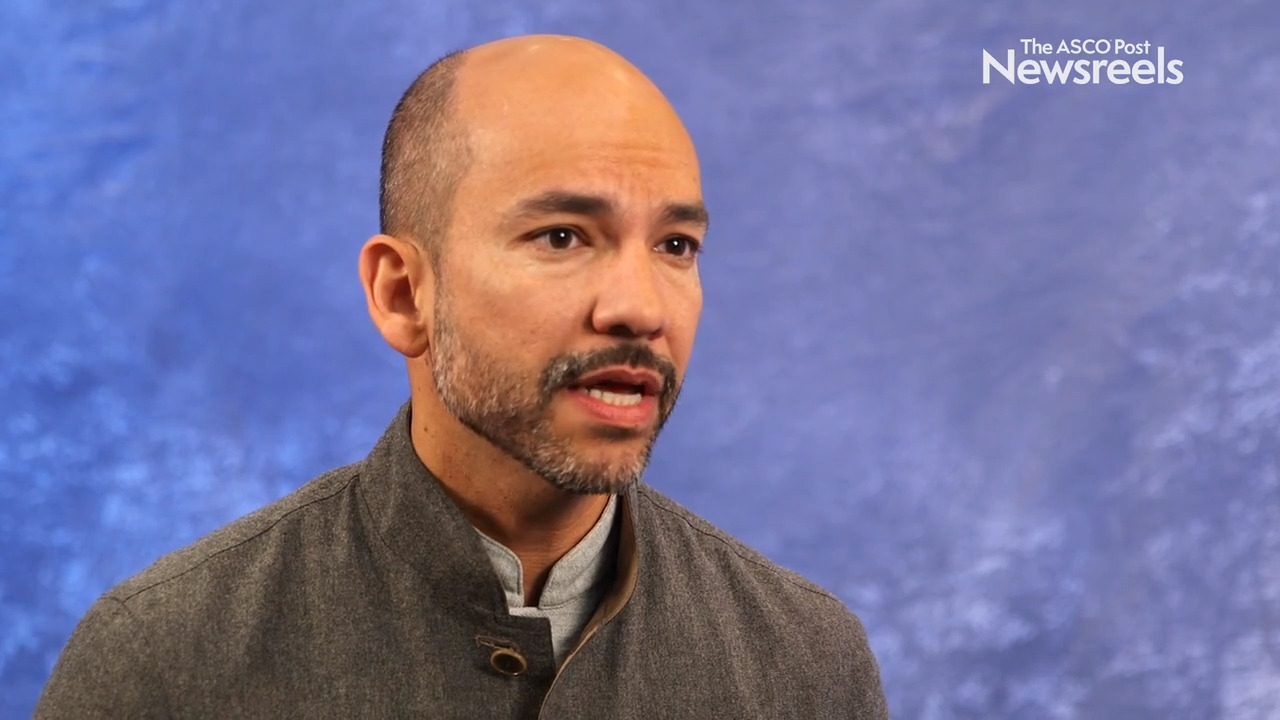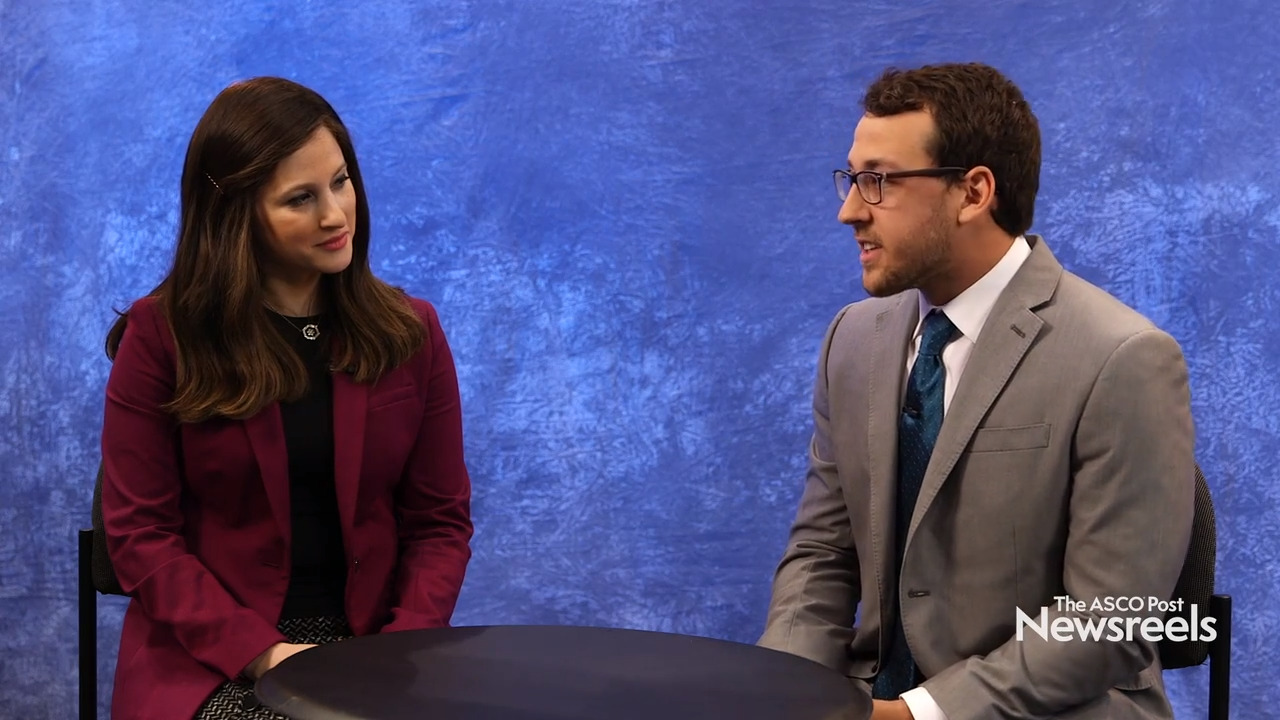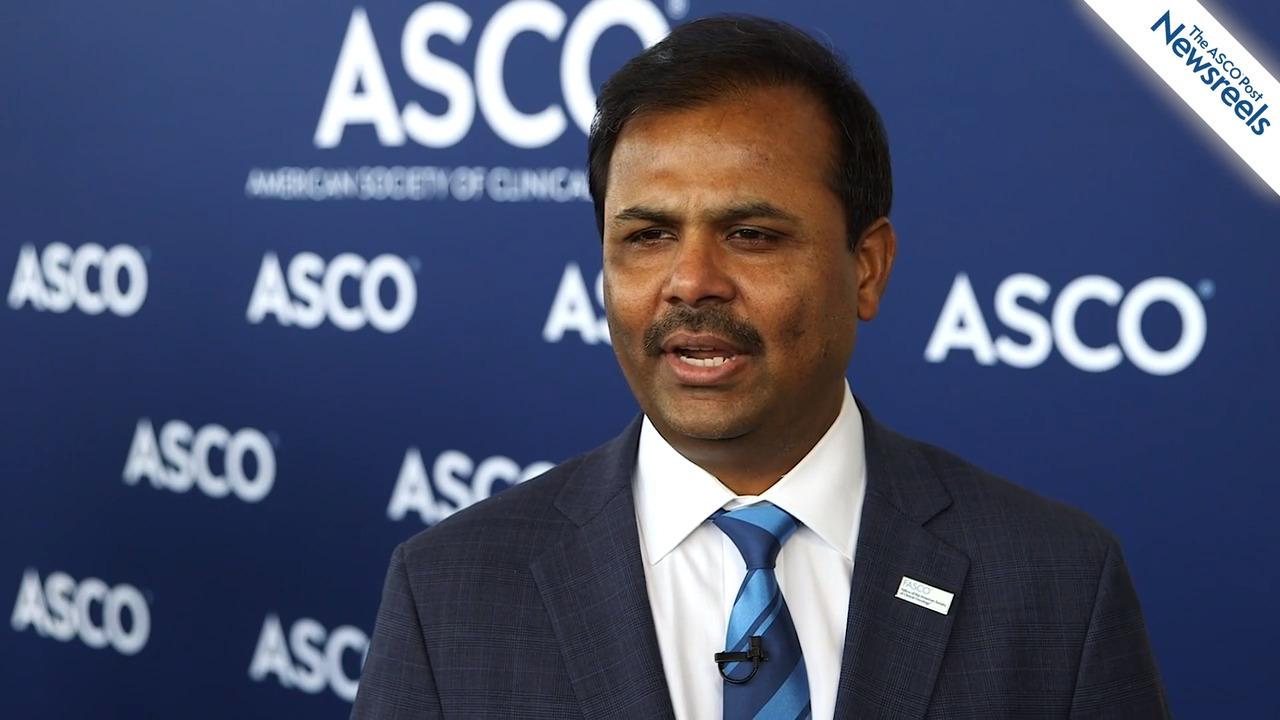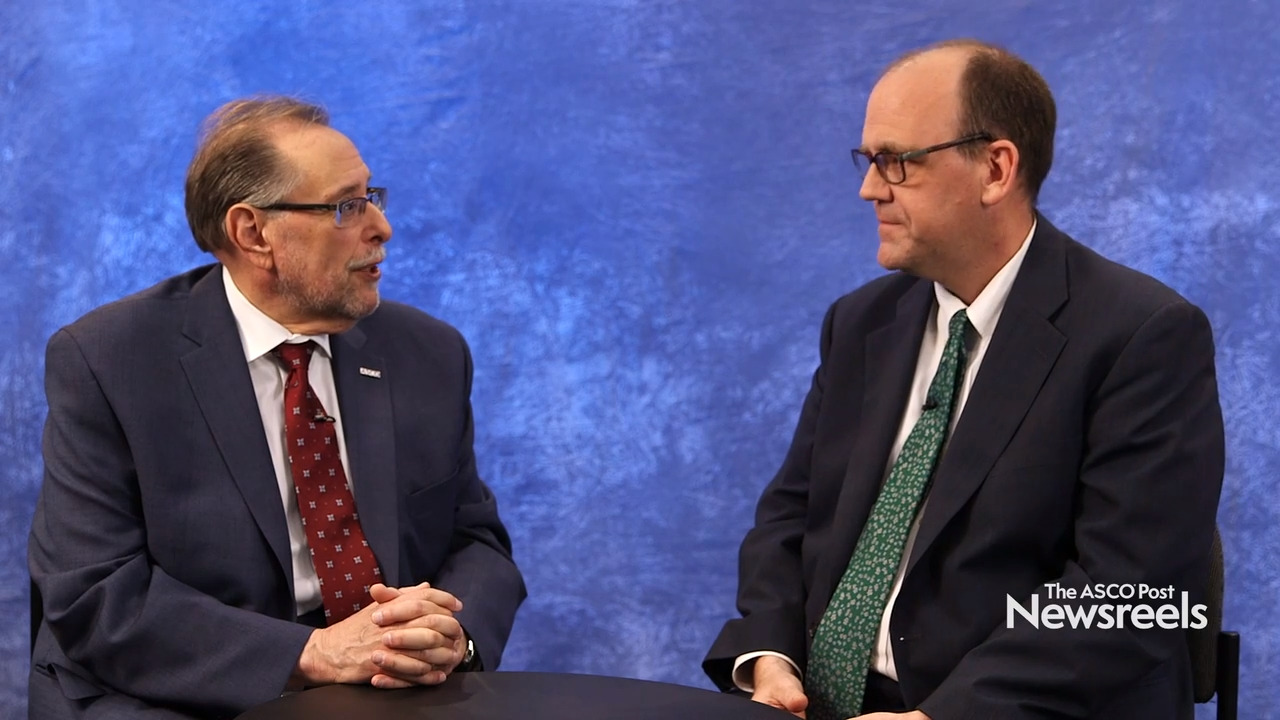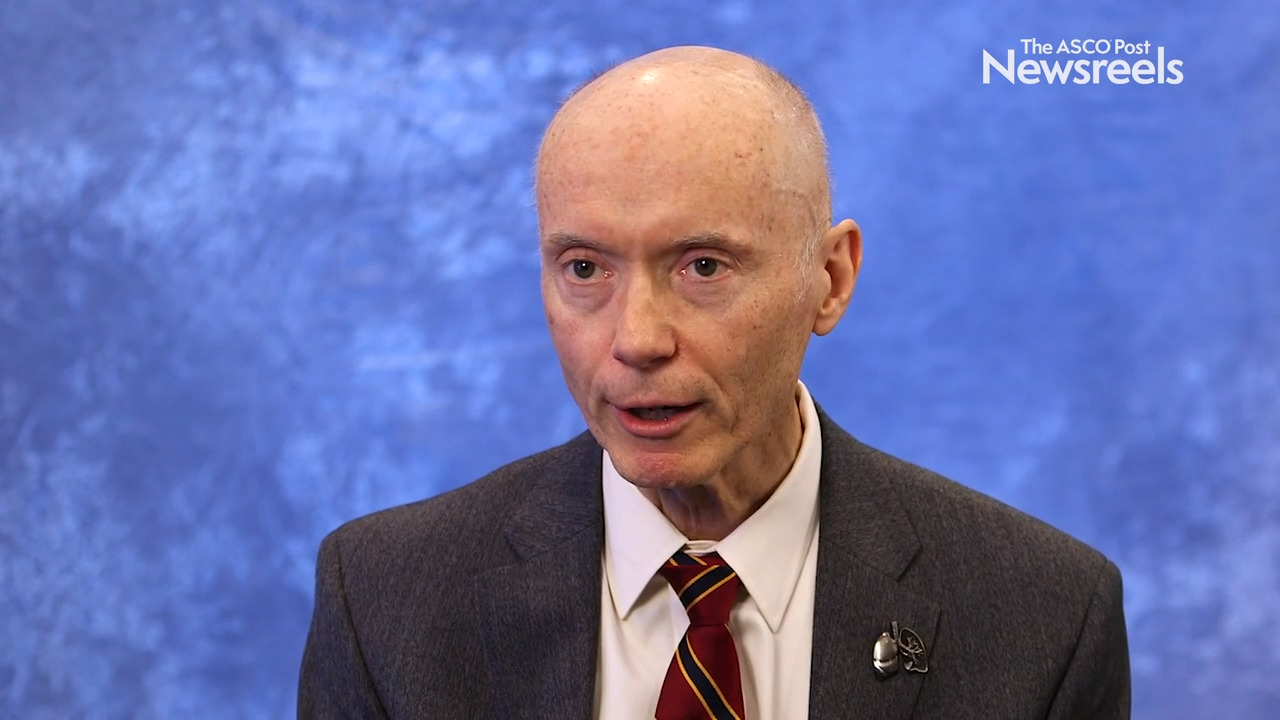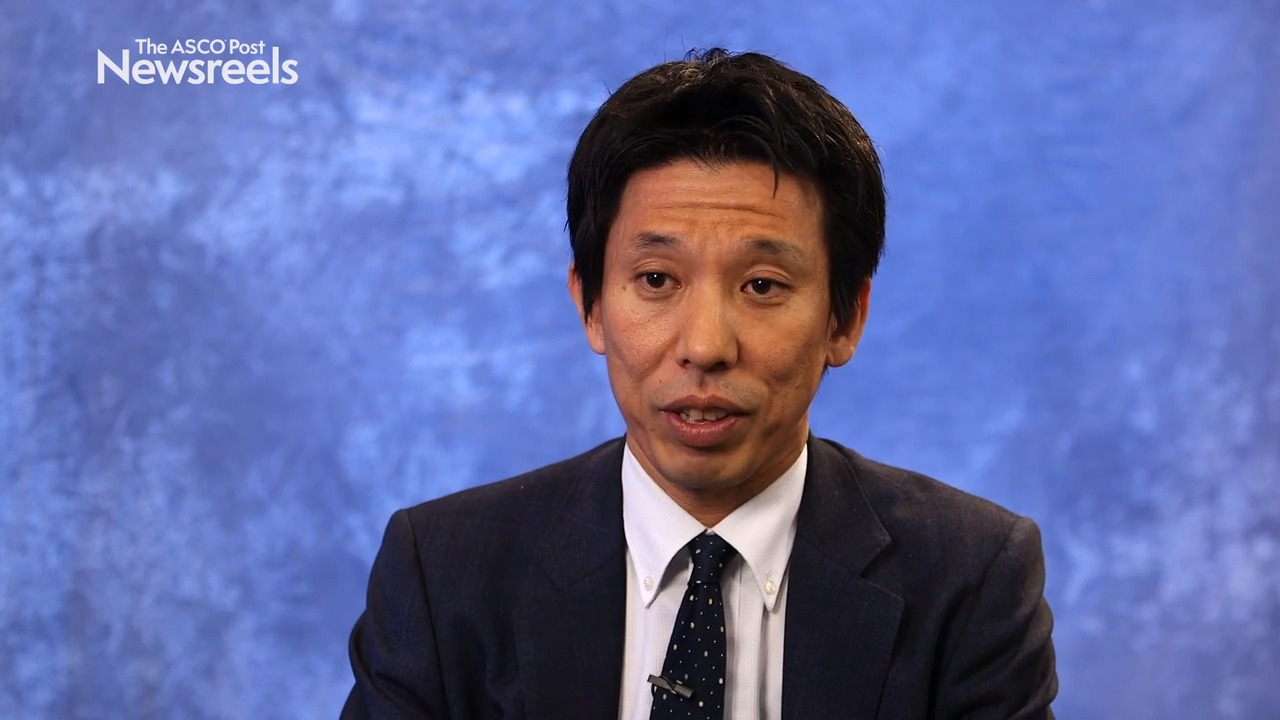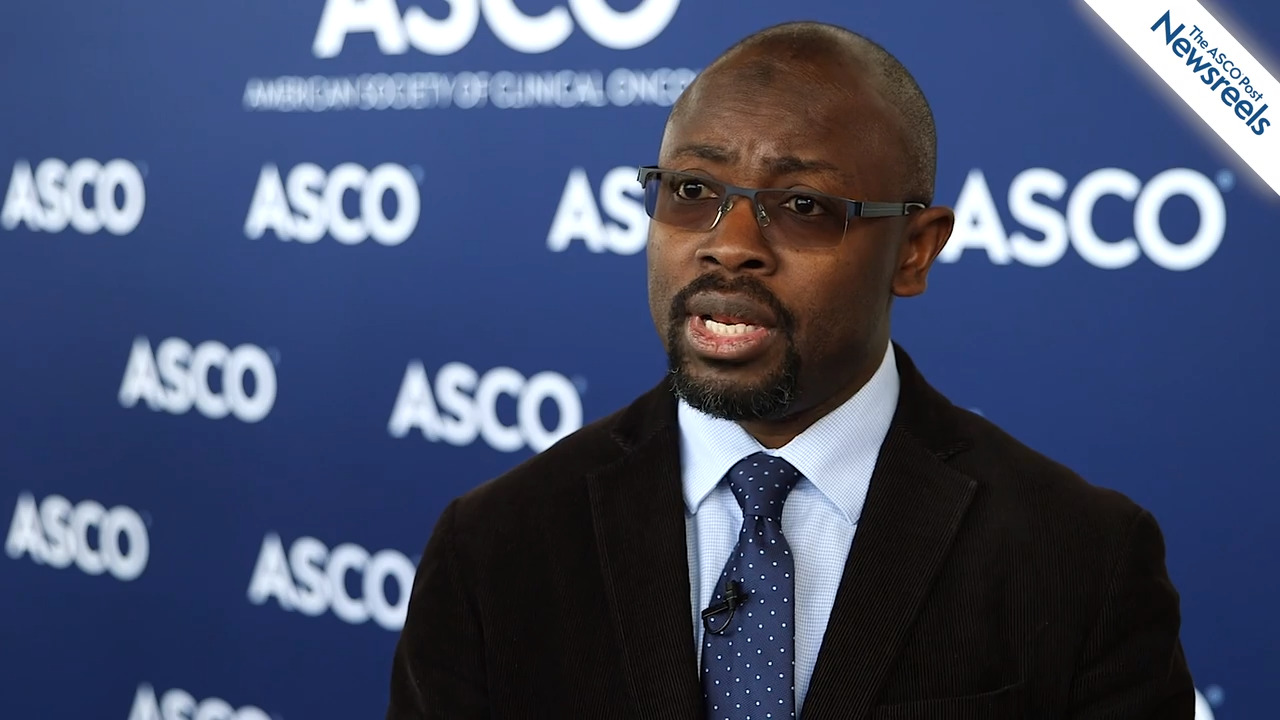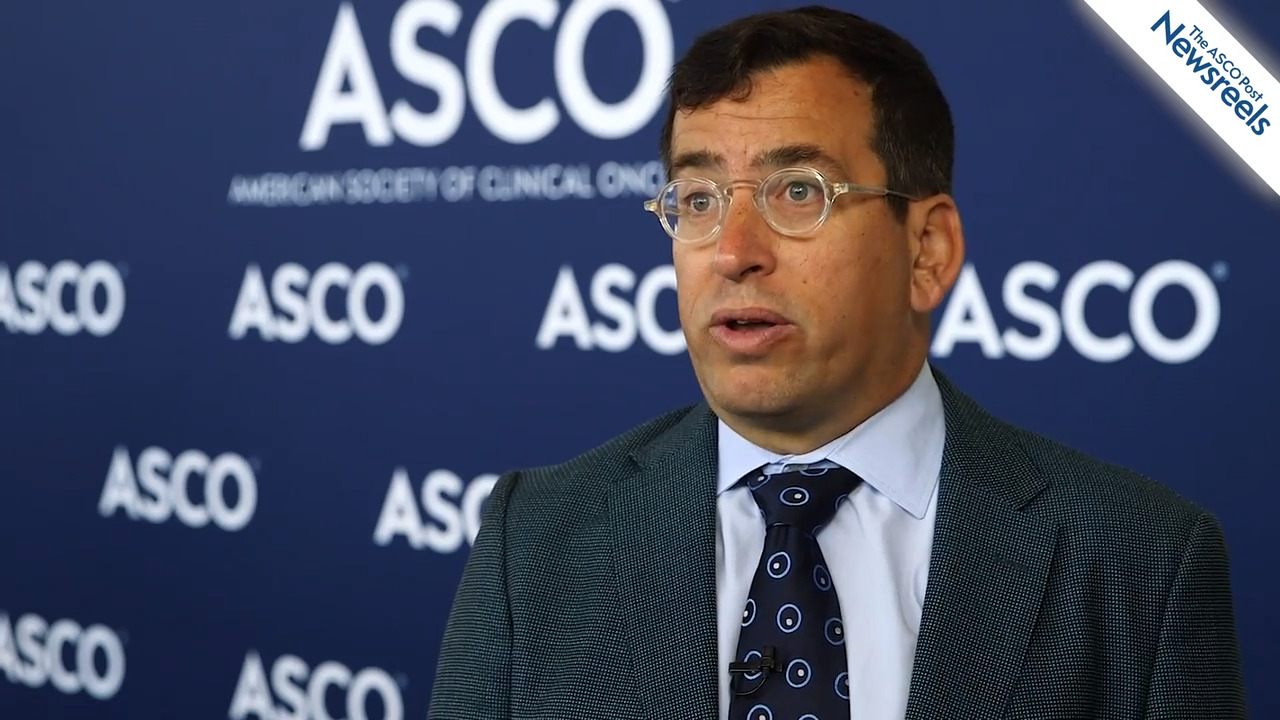Deep Natural Language Processing of Oncology Radiology Reports
Scientists have demonstrated that an artificial intelligence (AI) tool can perform as well as human reviewers—and much more rapidly—in extracting clinical information regarding changes in tumors from unstructured radiology reports for patients with lung cancer. These findings were...
Pembrolizumab After Stereotactic Body Radiotherapy in Advanced NSCLC
In a Dutch phase II study reported in JAMA Oncology, Theelen et al found that although use of stereotactic body radiotherapy prior to pembrolizumab increased the objective response rate vs pembrolizumab alone in metastatic non–small cell lung cancer (NSCLC), the difference did not meet study...
Expert Point of View: Sarina Anne Piha-Paul, MD, and Benjamin Besse, MD, PhD
THE INVITED discussants of the presentations on repotrectinib and AMG 510 were enthusiastic about these agents. Sarina Anne Piha-Paul, MD, of The University of Texas MD Anderson Cancer Center, discussed AMG 510, and Benjamin Besse, MD, PhD, Head of the Cancer Medicine Department at the Institut...
Two Investigational Agents Demonstrate Safety, Efficacy in Lung Cancer
A handful of investigational drugs in early-phase trials always create a buzz at ASCO Annual Meetings. Two that garnered attention this year, and could eventually change outcomes in the clinic, are the first-in-class KRAS inhibitor AMG 510 and the ROS1 inhibitor repotrectinib. Should late-phase...
FDA Approves Bevacizumab Biosimilar for Five Cancer Types
ON JUNE 28, the U.S. Food and Drug Administration (FDA) approved bevacizumab-bvzr (Zirabev), a biosimilar to bevacizumab (Avastin), for the treatment of five types of cancer: metastatic colorectal cancer; unresectable, locally advanced, recurrent, or metastatic nonsquamous non–small cell lung...
FDA Expands Indication for Pembrolizumab to Metastatic Small Cell Lung Cancer
ON JUNE 17, the U.S. Food and Drug Administration (FDA) granted accelerated approval to the anti– programmed cell death protein 1 (PD-1) therapy pembrolizumab (Keytruda) as monotherapy for patients with metastatic small cell lung cancer (SCLC) with disease progression on or after platinum-based...
Winship Cancer Institute Awarded Lung Cancer SPORE Grant From NCI
The Winship Cancer Institute of Emory University has been awarded a 5-year, $9.7 million Specialized Program of Research Excellence (SPORE) grant from the National Cancer Institute (NCI) to study new approaches for lung cancer treatment. It is reportedly the only grant of its kind to be awarded in...
Immunotherapy After Locally Ablative Therapy for Oligometastatic NSCLC
In a single-center phase II trial reported in JAMA Oncology, Bauml et al found that pembrolizumab given after locally ablative therapy appeared to be associated with improved outcomes in patients with oligometastatic non–small cell lung cancer (NSCLC). In the study, 45 evaluable...
Poorer Outcomes for Patients With Lung Cancer Undergoing Radiotherapy During Disaster-Level Hurricanes
Patients who experienced a disaster-level hurricance during radiotherapy for lung cancer had worse overall survival than those who completed treatment in normal circumstances, with longer disaster declarations associated with increasingly worse survival. These findings come from a...
Ramucirumab Plus Pembrolizumab in Previously Treated Advanced Gastroesophageal Cancer, NSCLC, and Urothelial Carcinoma
Results from a phase IB trial expansion stage reported in The Lancet Oncology by Herbst et al showed the combination of ramucirumab plus pembrolizumab had manageable toxicity and antitumor activity in previously treated advanced gastroesophageal cancer, non–small cell lung cancer (NSCLC), and ...
FDA Pipeline: Designations and Applications Granted in Lymphoma, Small Cell Lung Cancer, Multiple Myeloma, and More
Recently, the U.S. Food and Drug Administration (FDA) granted Fast Track designation to a phospholipid-drug conjugate in diffuse large B-cell lymphoma; granted Orphan Drug designation to an immunotherapy for small cell lung cancer (SCLC); accepted supplemental biologics license applications (sBLAs) ...
Cost-Effectiveness of Single-Marker Genetic Testing vs Multigene Panel Sequencing in Advanced NSCLC
The results of an economic modeling study to estimate the cost-effectiveness of multigene panel sequencing as compared to standard-of-care single-gene tests for patients with advanced non–small cell lung cancer (NSCLC) showed that multigene panel sequencing tests are moderately...
Risk-Prediction Model Aims to Predict Incident Lung Cancer in Patients With a Pulmonary Nodule
A risk-prediction model developed using clinical and radiologic features could stratify individuals presenting with a lung nodule as having a high or low risk for lung cancer, according to a study published by Nemesure et al in Cancer Prevention Research. “While lung nodules are not...
Frequency, Complications, and Costs of Diagnostic and Postprogression Biopsies in NSCLC
In a retrospective study reported in the Journal of Oncology Practice, Kelly et al identified the frequency of diagnostic and postprogression biopsies, complication rates, and associated costs in patients with non–small cell lung cancer (NSCLC). The study involved patient data from the...
Combination Immunotherapy and Inhibitors of DNA Damage Repair in the Treatment of Small Cell Lung Cancer
Unlike non–small cell lung cancer (NSCLC), which has seen a paradigm shift in treatment modalities with the discovery of genetic signatures (including EGFR mutations) that are responsive to targeted drugs, systemic treatment of small cell lung cancer (SCLC) has remained largely unchanged for over...
Do Statins Lower the Risk of Cardiovascular Complications in Patients Treated With Radiotherapy to the Chest, Neck, or Head?
Patients with cancer who took cholesterol-lowering statin medication following radiation therapy of the chest, neck, or head had significantly reduced risk of suffering a stroke—and possibly other cardiovascular complications—according to research published by Boulet et al in...
Advances in Targeted Therapy for Non–Small Cell Lung Cancer
Targeted therapies for non–small cell lung cancer (NSCLC) are a hotbed of investigation. Two new targeted therapies are promising for patients with lung tumors that are either EGFR exon 20 insertions or RET-rearranged. At the 2019 ASCO Annual Meeting, attendees heard early data on therapies...
Neoadjuvant Immunotherapy May Benefit Patients With Early-Stage NSCLC
Neoadjuvant immunotherapy had encouraging activity and demonstrated favorable safety in patients with resectable early-stage non–small cell lung cancer (NSCLC), according to two studies presented at the 2019 ASCO Annual Meeting.1,2 This approach has the potential to boost the survival rate in...
Extended Follow-up From the National Lung Screening Trial Reported
Early detection and treatment through screening with low-dose computed tomography (LDCT) has been investigated as a potential means of reducing lung cancer mortality for more than 2 decades. In 2011, a large U.S. study—the randomized National Lung Screening Trial (NLST)—reported a 20%...
FDA Approves Bevacizumab Biosimilar for Five Cancer Types
On June 28, the U.S. Food and Drug Administration (FDA) approved bevacizumab-bvzr (Zirabev), a biosimilar to bevacizumab (Avastin), for the treatment of five types of cancer: metastatic colorectal cancer; unresectable, locally advanced, recurrent, or metastatic nonsquamous non–small cell ...
Outcomes of Immune Checkpoint Inhibitor Treatment in Patients With Advanced NSCLC Receiving Baseline Corticosteroids
In a single-center study reported in the Journal of Clinical Oncology, Ricciuti et al found better outcomes with immune checkpoint inhibitor treatment among patients with advanced non–small cell lung cancer (NSCLC) receiving baseline prednisone equivalent of ≥ 10 mg daily for...
FDA Expands Indications for Pembrolizumab to Include Metastatic SCLC With Disease Progression on or After Other Therapies
On June 17, the U.S. Food and Drug Administration (FDA) granted accelerated approval to the anti–programmed cell death protein 1 (PD-1) therapy pembrolizumab (Keytruda) as monotherapy for the treatment of patients with metastatic small cell lung cancer (SCLC) with disease...
Radiotherapy Increases Adverse Cardiovascular Event Risk for Patients With Lung Cancer
A new retrospective study led by investigators from Brigham and Women’s Hospital and Dana-Farber Cancer Institute examined outcomes for patients after receiving treatment for locally advanced non–small cell lung cancer (NSCLC), finding that the average radiation dose delivered to the...
KEYNOTE-001: 5-Year Overall Survival With Pembrolizumab in Advanced NSCLC
Long-term follow-up of the phase I KEYNOTE-001 study reported in the Journal of Clinical Oncology by Garon et al showed that pembrolizumab monotherapy was associated with an estimated 5-year overall survival of 23.2% for treatment-naive patients and 15.5% for previously treated patients with...
Justin F. Gainor, MD, on Non–Small Cell Lung Cancer: Clinical Activity and Tolerability of Selective RET Inhibitor
Justin F. Gainor, MD, of Massachusetts General Hospital, discusses updated findings from the ARROW study in which BLU-667, a selective RET inhibitor, demonstrated clinical activity and tolerability in patients with advanced RET fusion–positive non–small cell lung cancer (Abstract 9008).
Luis G. Paz-Ares, MD, PhD, on Small Cell Lung Cancer: Efficacy and Safety of Lurbinectedin
Luis G. Paz-Ares, MD, PhD, of Hospital Universitario 12 de Octubre, discusses study findings on the second-line use of lurbinectedin in patients with both resistant and sensitive small cell lung cancer (Abstract 8506).
Addition of Bevacizumab to Erlotinib Improves Progression-Free Survival in EGFR-Mutated, Nonsquamous NSCLC
In an interim analysis of the phase III NEJ026 trial reported in The Lancet Oncology, Makoto Maemondo, MD, and colleagues found that the addition of bevacizumab to erlotinib improved progression-free survival in patients with EGFR-positive, nonsquamous non–small cell lung cancer (NSCLC). In the...
2019 ASCO: NEOSTAR: Neoadjuvant Nivolumab Plus Ipilimumab in Early-Stage, Resectable NSCLC
Neoadjuvant treatment with nivolumab plus ipilimumab resulted in an overall major pathologic response rate of 33% of treated patients with early-stage, resectable non–small cell lung cancer (NSCLC). With these results, the combination immunotherapy met the prespecified trial...
Survey Finds Prophylactic Cranial Irradiation Use in Decline for Extensive-Stage Small Cell Lung Cancer
Delivery of prophylactic cranial irradiation to patients with extensive-stage small cell lung cancer (SCLC) has declined significantly since the publication of a study by Takahashi et al, according to a recent survey of academic radiation oncologists.1 Data presented at the 2019 Multidisciplinary...
Pembrolizumab Improves Survival vs Chemotherapy in Previously Untreated Advanced NSCLC With PD-L1 Expression ≥ 1%
As reported in The Lancet by Tony S.K. Mok, MD, of Chinese University of Hong Kong, and colleagues, the KEYNOTE-042 trial has shown an improvement in overall survival with pembrolizumab vs standard chemotherapy in previously untreated patients with locally advanced or metastatic non–small cell lung ...
KEYNOTE-001 Shows Long-Term Survival Benefit With Pembrolizumab in Advanced NSCLC
Before the introduction of immunotherapy with checkpoint inhibitors, the 5-year life expectancy for patients with advanced non–small cell lung cancer (NSCLC) was 5.5%. This dismal outlook has changed. Treatment with the immune checkpoint inhibitor pembrolizumab dramatically improved overall...
IMpower130: Addition of First-Line Atezolizumab to Chemotherapy in Metastatic Nonsquamous NSCLC
As reported in The Lancet Oncology by West et al, the phase III IMpower130 trial found that the addition of atezolizumab to carboplatin plus nab-paclitaxel significantly improved overall and progression-free survival in first-line treatment of stage IV nonsquamous non–small cell lung cancer...
Gilberto Lopes, MD, MBA, on the RELAY Trial in Metastatic NSCLC: Erlotinib and Ramucirumab in EGFR Mutant–Positive Disease
Gilberto Lopes, MD, MBA, of the Sylvester Comprehensive Cancer Center at the University of Miami, offers commentary on phase III findings from the RELAY study, which showed that erlotinib plus ramucirumab led to superior progression-free survival in previously untreated patients with EGFR mutant–positive NSCLC (Abstract 9000).
Miriam Knoll, MD, and Richard J. White, DO, on Non–Small Cell Lung Cancer: Predicting Radiotherapy/Immunotherapy Treatment Outcomes
Miriam Knoll, MD, of Hackensack University Medical Center, and Richard J. White, DO, of Allegheny Health Network, discuss improved overall survival among younger female patients with non–small cell lung cancer who have a lower comorbidity score, lower grade, private insurance, and treatment with intensity-modulated radiation therapy (Abstract 9024).
Suresh S. Ramalingam, MD, on Non–Small Cell Lung Cancer: Pemetrexed, Bevacizumab, or Both as Maintenance Therapy
Suresh S. Ramalingam, MD, of Winship Cancer Institute, Emory University, discusses findings from the ECOG-ACRIN 5508 study, which showed that single-agent bevacizumab or pemetrexed is the optimal maintenance therapy for advanced nonsquamous NSCLC (Abstract 9002).
Richard L. Schilsky, MD, and R. Donald Harvey, PharmD, BCOP, on Advanced Non–Small Cell Lung Cancer: Expanding the Criteria for Clinical Trial Eligibility
Richard L. Schilsky, MD, of ASCO, and R. Donald Harvey, PharmD, BCOP, of Winship Cancer Institute of Emory University, discuss their study findings that expanding the clinical trial eligibility criteria for patients with advanced NSCLC would enable nearly twice as many people to be considered for participation (Abstract LBA108).
2019 ASCO: Expansion of Clinical Trial Inclusion Criteria in Patients With Advanced NSCLC
A study that examined 10,500 health records of patients with advanced non–small cell lung cancer from ASCO’s CancerLinQ database found that the use of expanded clinical trial inclusion criteria—as proposed by ASCO and Friends of Cancer Research in 2017—would nearly double...
David J. Kwiatkowski, MD, PhD, on Non–Small Cell Lung Cancer: Neoadjuvant Immunotherapy for Resectable Disease
David J. Kwiatkowski, MD, PhD, of Brigham and Women’s Hospital and Dana-Farber Cancer Institute, discusses an interim analysis and biomarker data from a multicenter study showing that 19% of patients with NSCLC had a major pathologic response to preoperative treatment with atezolizumab (Abstract 8503).
Hirotsugu Kenmotsu, MD, on Nonsquamous Non–Small Cell Lung Cancer: Pemetrexed Plus Cisplatin vs Vinorelbine Plus Cisplatin
Hirotsugu Kenmotsu, MD, of Shizuoka Cancer Center, discusses the phase III JIPANG trial findings, which showed that pemetrexed plus cisplatin was not superior to vinorelbine plus cisplatin in terms of recurrence-free survival for patients with completely resected nonsquamous non–small cell lung cancer (Abstract 8501).
Taofeek Kunle Owonikoko, MD, PhD, on Small Cell Lung Cancer: Tremelimumab and Durvalumab With or Without Radiation
Taofeek Kunle Owonikoko, MD, PhD, of Emory University, discusses the findings of his phase II study, which assessed the efficacy of combined immune checkpoint inhibitors with or without radiation in relapsed small cell lung cancer (Abstract 8515).
Edward B. Garon, MD, on Advanced Non–Small Cell Lung Cancer: KEYNOTE-001 Trial on Pembrolizumab
Edward B. Garon, MD, of the David Geffen School of Medicine at the University of California, Los Angeles, discusses long-term survival data on patients with advanced non–small cell lung cancer treated with pembrolizumab and those with PD-L1 expressed in at least half of their tumor cells (Abstract LBA9015).
2019 ASCO: KEYNOTE-001: 5-Year Survival Data for Patients With Advanced NSCLC Treated With Pembrolizumab
Five-year data from the phase Ib KEYNOTE-001 trial showed that treatment with pembrolizumab was safe and effective and substantially increased overall survival in patients with advanced non–small cell lung cancer (NSCLC). Specifically, 23.2% of people who had not previously been treated with...
Addition of Bevacizumab to Carboplatin/Pemetrexed in Nonsquamous NSCLC
New research published by Bagley et al in JNCCN—Journal of the National Comprehensive Cancer Network used a large real-world data set to demonstrate a modest but consistent survival benefit associated with adding bevacizumab to carboplatin/pemetrexed in advanced nonsquamous non–small...
FDA Approves the NovoTTF-100L System in Combination With Chemotherapy for Malignant Pleural Mesothelioma
On May 23, the U.S. Food and Drug Administration (FDA) approved the NovoTTF-100L System in combination with pemetrexed plus platinum-based chemotherapy for the first-line treatment of unresectable locally advanced or metastatic malignant pleural mesothelioma. NovoTTF-100L is a noninvasive,...
FDA Expands Pembrolizumab Indication for NSCLC in First-Line Setting
On April 14, the U.S. Food and Drug Administration (FDA) approved pembrolizumab (Keytruda) for the first-line treatment of patients with stage III non–small cell lung cancer (NSCLC) who are not candidates for surgical resection or definitive chemoradiation, or those with metastatic NSCLC....
Two Prominent Lung Cancer Organizations Join Forces to Launch GO2 Foundation for Lung Cancer
Two of the nation’s leading lung cancer organizations—the Bonnie J. Addario Lung Cancer Foundation (ALCF) and the Lung Cancer Alliance (LCA)—announced in April their merger to form the GO2 Foundation for Lung Cancer. The new organization, which has offices in Washington, DC, and the San Francisco...
ACCURE Trial: Improving Racial Disparities in Treatment for Patients With Early-Stage Lung and Breast Cancers
Results from a study published by Cykert et al in The Journal of the National Medical Association show that a pragmatic system-based intervention within cancer treatment centers can nearly eliminate existing disparities in treatment and outcomes for black patients with early-stage...
Evidence Mounts for Tumor Mutational Burden as Biomarker of Immune Checkpoint Inhibitor Benefit in NSCLC
The search for biomarkers to identify patients who are likely to respond to immunotherapy continues. According to biomarker tissue and blood analysis of patients enrolled in the phase III MYSTIC trial, high tumor mutational burden in both tissue and blood identified patients with non–small cell...
NCCN Clinical Practice Guidelines in Oncology: 2019 Updates
In 1996, the National Comprehensive Cancer Network® (NCCN®) published its first set of Clinical Practice Guidelines in Oncology (NCCN Guidelines®), covering eight tumor types. NCCN Guidelines are now published for more than 70 tumor types and topics. Some of the key updates for 2019 were presented...
Long-Term Results With Local Consolidative Therapy vs Maintenance Therapy or Observation in Oligometastatic NSCLC
In long-term follow-up of a phase II study reported in the Journal of Clinical Oncology, Gomez et al confirmed superior outcomes with local consolidative therapy vs maintenance therapy or observation in patients with oligometastatic non–small cell lung cancer (NSCLC). In the open-label,...
